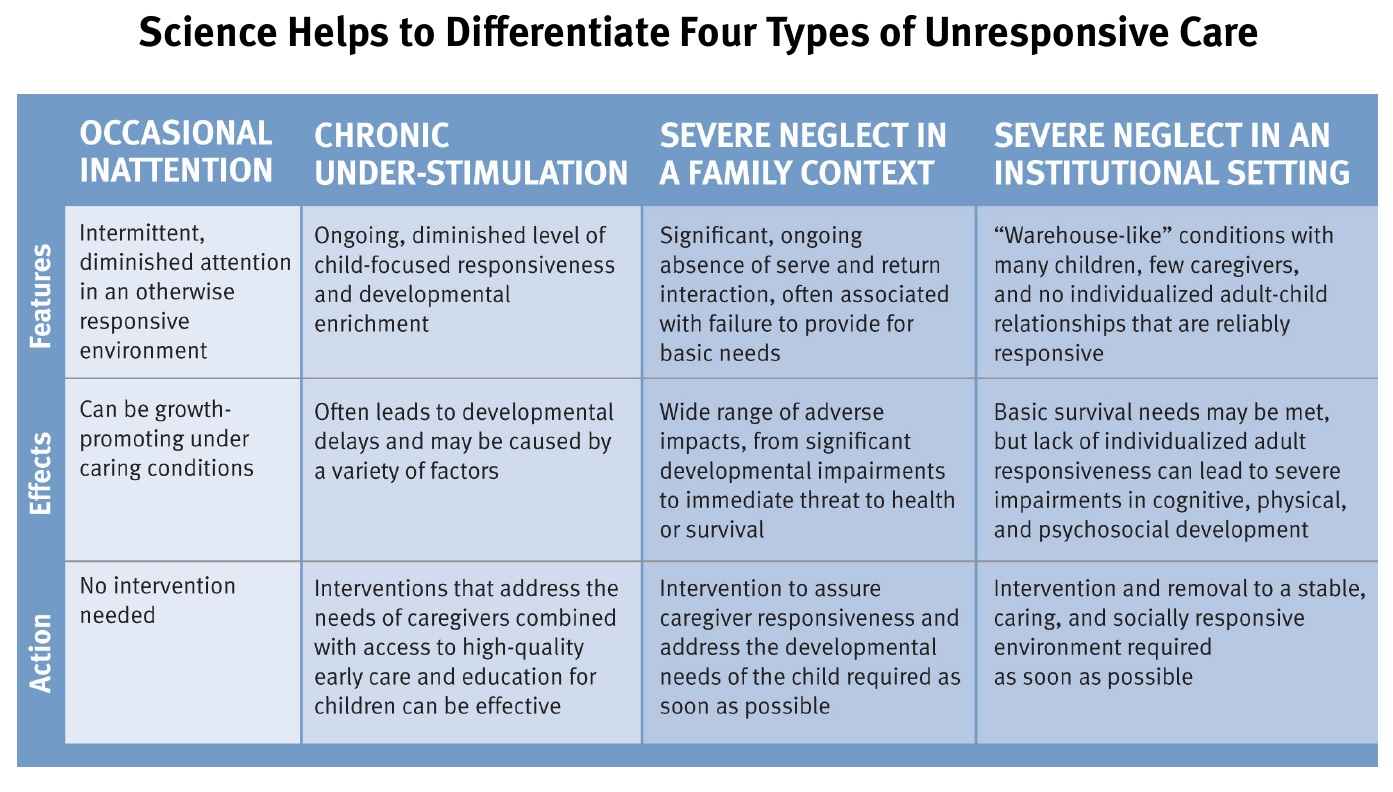Inbrief: The Science of Neglect

Addiction Multimedia
Addiction Epigenetics
Drug Endangered Children and Child Welfare Articles
Addiction Neuroscience Articles and News
Epigenetics
Overview
Originally Published: 10/31/2013
Post Date: 02/15/2016
Similar Articles: See the similar article
Video
Summary/Abstract
Extensive biological and developmental research shows significant neglect—the ongoing disruption or significant absence of caregiver responsiveness—can cause more lasting harm to a young child's development than overt physical abuse, including subsequent cognitive delays, impairments in executive functioning, and disruptions of the body's stress response.
Content
Inbrief: The Science of Neglect
Thriving communities depend on the successful development of the people who live in them, and building the foundations of successful development in childhood requires responsive relationships and supportive environments. Beginning shortly after birth, the typical “serve and return” interactions that occur between young children and the adults who care for them actually affect the formation of neural connections and the circuitry of the developing brain. Over the next few months, as babies reach out for greater engagement through cooing, crying, and facial expressions–and adults “return the serve” by responding with similar vocalizing and expressiveness–these reciprocal and dynamic exchanges literally shape the architecture of the developing brain. In contrast, if adult responses are unreliable, inappropriate, or simply absent, developing brain circuits can be disrupted, and subsequent learning, behavior, and health can be impaired.

1 Because responsive relationships are both expected and essential, their absence is a serious threat to a child’s development and wellbeing. Sensing threat activates biological stress response systems, and excessive activation of those systems can have a toxic effect on developing brain circuitry. When the lack of responsiveness persists, the adverse effects of toxic stress can compound the lost opportunities for development associated with limited or ineffective interaction. This multifaceted impact of neglect on the developing brain underscores why it is so harmful in the earliest years of life and why effective early interventions are likely to pay significant dividends in better, long-term outcomes in educational achievement, lifelong health, and successful parenting of the next generation.
2 Chronic neglect is associated with a wider range of damage than active abuse, but it receives less attention in policy and practice. Science tells us that young children who experience significantly limited caregiver responsiveness may sustain a range of adverse physical and mental health consequences that actually produce more widespread developmental impairments than overt physical abuse. These can include cognitive delays, stunting of physical growth, impairments in executive function and self-regulation skills, and disruptions of the body’s stress response. With more than a half million documented cases in the U.S. in 2010 alone, neglect accounts for 78% of all child maltreatment cases nationwide, far more than physical abuse (17%), sexual abuse (9%), and psychological abuse (8%) combined. Despite these compelling findings, child neglect receives far less public attention than either physical abuse or sexual exploitation and a lower proportion of mental health services.
3. Studies on children in a variety of settings show conclusively that severe deprivation or neglect:
- disrupts the ways in which children’s brains develop and process information, thereby increasing the risk for attentional, emotional, cognitive, and behavioral disorders.
- alters the development of biological stress-response systems, leading to greater risk for anxiety, depression, cardiovascular problems, and other chronic health impairments later in life.
- is associated with significant risk for emotional and interpersonal difficulties, including high levels of negativity, poor impulse control, and personality disorders, as well as low levels of enthusiasm, confidence, and assertiveness.
- is associated with significant risk for learning difficulties and poor school achievement, including deficits in executive function and attention regulation, low IQ scores, poor reading skills, and low rates of high school graduation.
4. The negative consequences of deprivation and neglect can be reversed or reduced through appropriate and timely interventions, but merely removing a young child from an insufficiently responsive environment does not guarantee positive outcomes. Children who experience severe deprivation typically need therapeutic intervention and highly supportive care to mitigate the adverse effects and facilitate recovery.
For more information, see “The Science of Neglect: The Persistent Absence of Responsive Care Disrupts the Developing Brain” and the Working Paper series from the Center on the Developing Child at Harvard University. www.developingchild.harvard.edu/resources/





